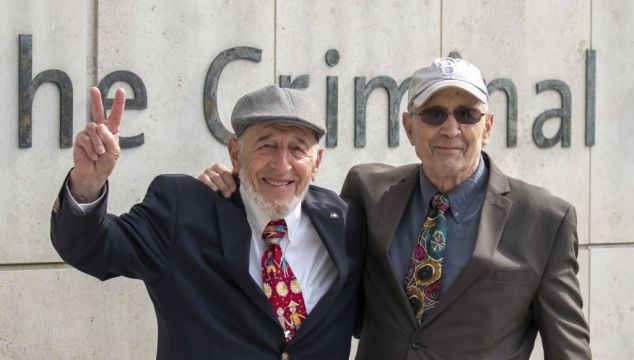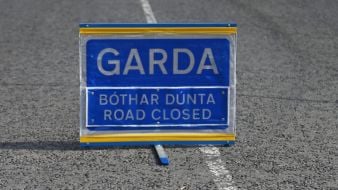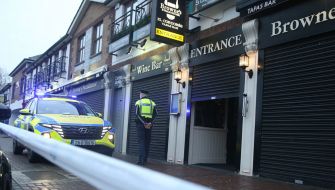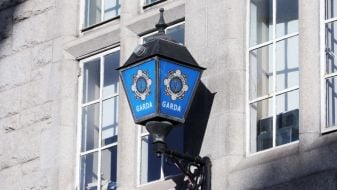Two US army veterans in their 80s have been convicted of interfering with the operation of Shannon Airport as part of an anti-war protest three years ago.
The jury at Dublin Circuit Criminal Court acquitted Ken Mayers (85) and Tarak Kauff (80) of criminal damage to an airport perimeter fence and of trespassing at the airport with the intent to commit an offence or interfere with property.
The verdicts came in on Tuesday afternoon after just over five and a half hours of deliberations.
The jury returned a majority verdict of guilty on the charge of interfering with the operation, safety or management of an airport by entering the runway area and causing the airport to close. The majority verdict was 10 to two, the court heard.
After the verdicts were handed down, defence counsel asked that the men be allowed to return to the US and come back in a fortnight for sentence. This was opposed by the prosecution.
Judge Patricia Ryan noted the men had been found guilty of a serious charge.
“They have lost the presumption of innocence,” she said.
She ordered that they return their passports, and she set a sentence date of Wednesday.
Anti-war activists
The five-day trial heard that at around 10am on St Patrick's Day 2019, the two men cut a hole in the airport perimeter fence with a pair of bolt cutters - causing damage to the value of €590 - before walking onto airport lands.
They were met on a taxiway by an airport officer after staff were alerted to a security breach. When asked what they were doing, the pair said they were peace protesters who were there to inspect US military aircraft. They had a folded-up banner with them.
The airport was shut down for about 40 minutes, the trial heard, with two planes delayed in departing and one cargo plane forced to stay in the air until given the all-clear.
The court heard both men served in the United States military before becoming anti-war activists in the 1960s. They are members of a US-based group called Veterans for Peace.
From the outset, they both admitted cutting the hole in the fence and entering the airport lands.
Giving evidence to the jury, they said they did so to protest against the United States' military use of Shannon as a stop-over en route to places such as the Middle East.
'The nicest and most courteous protesters'
Mayers, of Monte Alte Road, Santa Fe, New Mexico and Kauff, of Arnold Drive, Woodstock, New York had both pleaded not guilty to trespassing, criminal damage and interfering with the operation, safety or management of Shannon Airport on March 17th, 2019.
The atmosphere in the trial was at times congenial, with every airport official and garda who dealt with the men describing them as courteous and respectful. Airport and fire officer Richard Moloney said they were “the nicest and most courteous” protesters he had ever met in his 19 years at Shannon Airport.
In turn, Mayers and Kauff praised the officials they dealt with for their respect and professionalism, saying they had never been treated better in their years of protesting.
The two pensioners spent 13 days in Limerick Prison in 2019, after bail was denied in the District Court amid garda fears they would flee the jurisdiction. This was overturned in the High Court, but they remained in Ireland for a further nine months until their passports were returned. They returned from the US to stand trial in Dublin.
At the heart of the defence case in relation to the criminal damage charge was the assertion that the accused men held an honestly-held belief that their action in cutting the fence was justified in order to protect other persons.
The jury was told it was not necessary for this belief to be justified, but that the belief had to be honestly held. In her directions, Judge Patricia Ryan told the jury it was being asked to get into the minds of the two accused.
In his closing speech, Tony McGillicuddy BL, prosecuting, acknowledged the jury might have sympathy for the two defendants.
“They are sincere and honourable persons,” he said. “That can't be disputed and is not disputed.”
But Mr McGillicuddy said the jury must put sympathy aside and have regard to the law in the case.
The prosecution case was that the men did not have any lawful excuse to damage the perimeter fence. He said there was no evidence there were any munitions on board the plane. He said there was no evidence in relation to there being a need to protect any persons.
“They were there for education purposes and the education of law enforcement personnel,” Mr McGillicuddy said. He said they were “making a political statement, drawing attention to matters, highlighting matters”.
“That may be very understandable but it is not a lawful excuse under the Criminal Damage Act,” he said.
In relation to the charge of interfering with the operation, safety and management of an airport, Mr McGillicuddy submitted that the men's presence on the taxiway at Shannon Airport caused the closure of the airport.
In relation to the charge of trespassing with intent to cause damage or interfere with property, the prosecution case was that the men had admitted to entering the airport grounds and had told officials that they were there to inspect a plane.
'Political posturing'
Michael Hourigan BL, defending Mayers, told the jury that the men were not engaged in some kind of “political posturing”, but had an honestly-held belief that the actions they did on that day could save lives.
Mayers had “an ethical and moral obligation he felt, on the basis of all he had experienced and all that he knew,” Mr Hourigan said.
In relation to the prosecution assertion that there were no arms on board the plane that day, Mr Huorigan noted that no airport official inspected the plane, nor was there a practice of inspecting US military planes at Shannon Airport.
“You do not have to determine whether or not there were arms on that plane or a breach of Irish neutrality,” Mr Hourigan said.
“It is whether these sincere and honourable men are being sincere and honourable when they tell you: 'This is what I believe, and this is what I did'.”
He put it to the jury members that when they reach the age of 83, they may be “doing something different than standing in the mud in a wet field in Clare”.
“But that is what he (Mayers) felt he had to do to protect human life.”
Mr Hourigan said there was a lot more to constitutional democracy than the letter of the law.
“The jury is the lamp that shows that freedom lives,” he said, quoting on old legal saying.
“Be the lamp and show that freedom lives. The only way you can do that is by delivering verdicts of not guilty.”
'Hope is a powerful thing'
In her closing speech, Carol Doherty BL, defending Kauff, told the jury “the best thing about the law in Ireland” was that there is a built-in mechanism to ensure that in the right circumstances, a person cannot be convicted of criminal damage, provided they can show they honestly believed their actions were lawful.
She recalled her client's evidence to the jury that he believed the plane at Shannon was a “US war machine” en route to war-torn Yemen.
In relation to the charge of interfering with the operation of the airport, Ms Doherty said the airfield was closed to ensure no one else was on the airfield, not because her client was walking along the taxiway.
In relation to the allegation the men trespassed with the intent to carry out criminal damage or interfere with property, Ms Doherty said that when he was met by the airport officer, Kauff had a phone, his wallet and a folded-up banner on his person and nothing else.
Ms Doherty said Kauff had dedicated his life to peaceful protest.
“People who go against the great can make a difference,” she said.
“It's reasonable to assume Mr Kauff and Mr Mayers might have made a difference. Hope is a powerful thing. The fact that hope wasn't realised on this occasion doesn't mean this action wasn't justified.”







